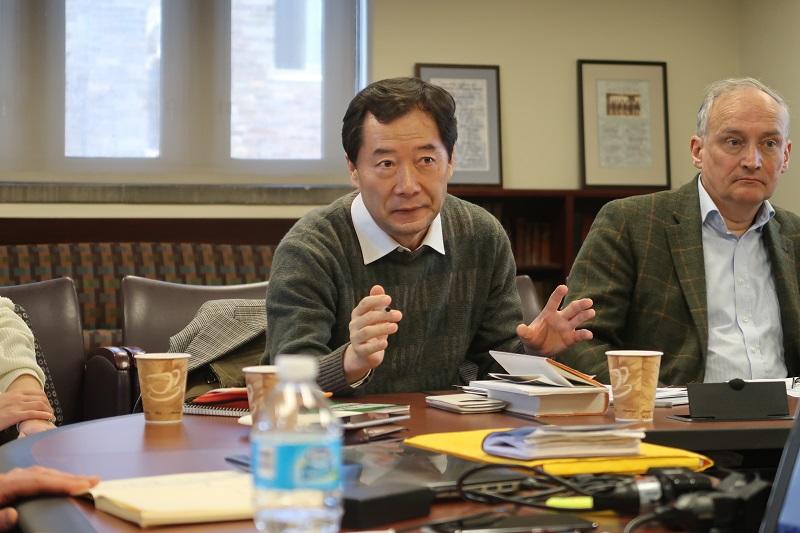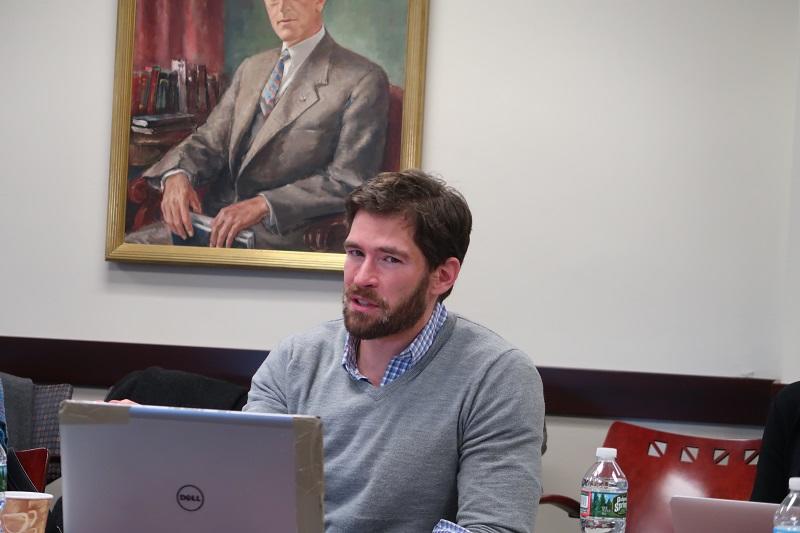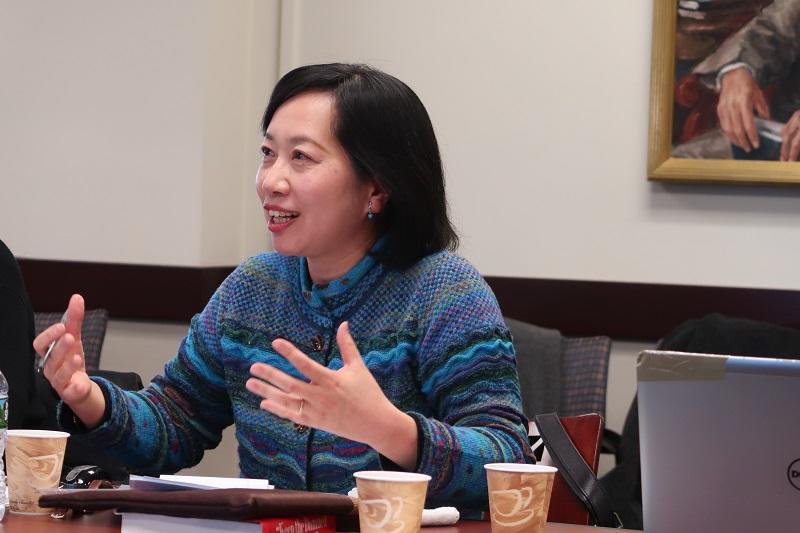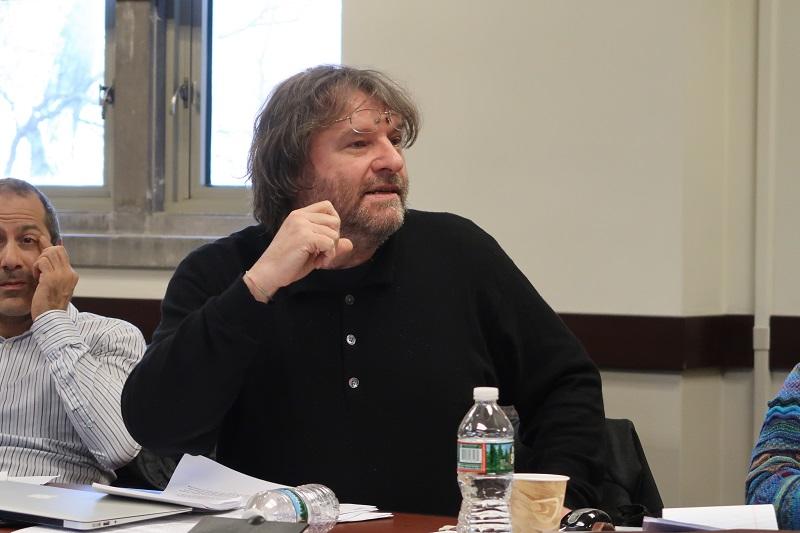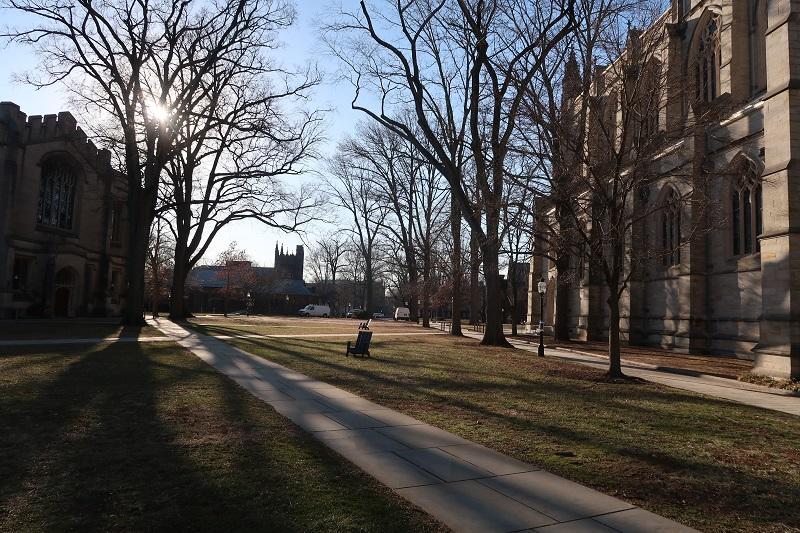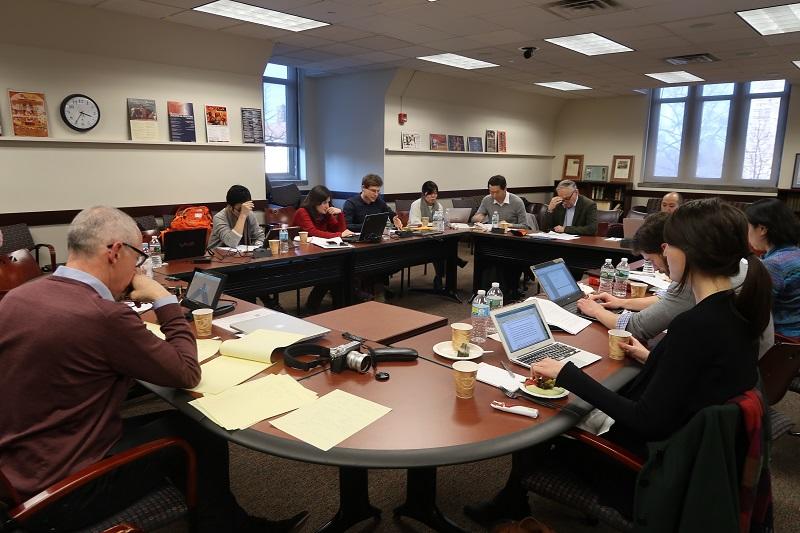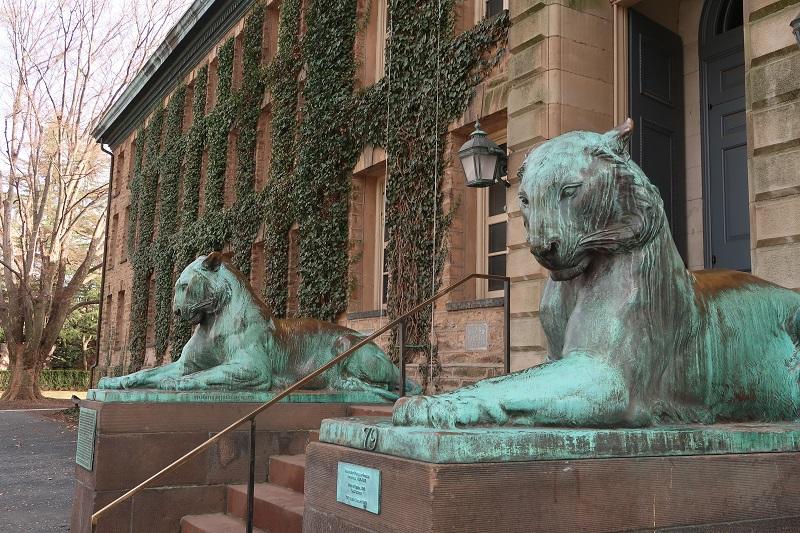2018.02.20
第4回GHC共同研究セミナー "National Narratives of Global Integration" / GHC Joint Seminar
大学院生によるウィンタースクールに引き続き、2018年1月26日及び27日にはプリンストン大学でGHCの各拠点にあたる東京、プリンストン、パリ (EHESS)、ベルリン(フンボルト大学)から集った研究者、及び2017年度東洋文化研究所で客員教授を務めた包茂紅・北京大学教授も東京拠点の研究者の資格で参加して、"National Narratives of Global Integration"と題するワークショップが開かれた。これは2017年9月にベルリンで開催されたサマースクールにおけるセッションでの議論を引き継ぐもので、同じテーマであと何回か議論を重ねた後に、その成果を論文集として出版する計画となっている。
テーマごとに設定された各パネルでは120分の時間の中で、2人の報告者が事前に配布したペーパーの簡単な説明を行った後にディスカッサントによるコメントがなされ、さらに全ての参加者による自由闊達な議論が続けられるという形式をとった。ワークショップのテーマに即して、各報告では各時代の国際関係の中で展開された国民国家の言説が分析の遡上に挙げられることになった。従来一国史の枠組みの中で解釈・理解されていた言説をグローバルな文脈に置いてみると、見える景色が相当に異なる。報告者は、このコントラストを十分に意識して議論を組み立てているため、しかし、個々の報告に特色はあるが、全体としてまとまったレベルの高いワークショップとなった。
各パネルでは、グローバル・ヒストリーの方法論についても活発な意見交換がされた。例えば言説の国際的伝播をモデル化する上で、ヨーロッパを中心とした一方通行的な潮流を見るのでなく日本あるいは中国を起点とした視点を導入すること、また国民国家建設期や冷戦期の「東」側の価値基準や脱植民地化の動きを念頭に置いて個々の言説を論じることの重要性について協議された。総じて個々の研究者がグローバル・ヒストリーのフレームワークを更新あるいは共有する上で、次回の会合に発展するような議論の焦点を確認することが出来た。
研究テーマが確立された研究者の発表と、シビアだがユーモアと笑いが飛び交う議論は、本ワークショップに参加した大学院生にとっても学びの多いものであった。また、初日の夜に開催された夕食会では、「これまで行ったフィールド調査で最も恥ずかしかったエピソード」を一人ずつ話す趣向があり、世界各地での各研究者の体験話で大変盛りあがった夜となった。国際色豊かなテーブルで1エピソードをユーモア豊かに披露できる研究者になれるように、と大学院生の研究闘志が燃えた。
なお、二日間の会合のプログラムは以下の通りである。
January 26
Panel 1, "Law, Empires and World Orders" Comment Cyrus Schayegh (Geneva)
Paules Xavier (EHESS), "Going beyond the "Western impact" narrative: China as a world power, 1850-1950"
Natasha Wheatley (Princeton), "The Boomerang of Imperial Sovereignty: Bosnia Herzegovina in the Eye of the World Storm"
Panel 2, "19th century makings" Comment Masashi Haneda (Tokyo)
SANO Mayuko (Tokyo), "Describing the self and finding a place in the world: Japan at 19th century expos"
Matthew Karp (Princeton), ""This Nation is a Globe": Nineteenth-Century American Narratives of Global Integration"
Panel 3, "Decolonization Narratives" Comment Jeremy Adelman (Princeton)
Marc Elie (EHESS), "The decolonized observe decolonization: Soviet Central Asian elites and the independence of Asia and Africa, 1940s-1980s"
Vincent Houben (Humboldt), "Decolonization Narratives - global Indonesia"
January 27
Panel 4, "Personal Narratives of the Global" Comment Andreas Eckert (Humboldt)
BAO Maohong (Beijing), "Three Chinese politicians' national narratives of global integration and their influences on history writing in China"
Silvia Sebastiani (EHESS), "How to write the history of a colony? Edward Long's History of Jamaica, between the national and the global"
Following on from the winter school for graduate students, a workshop titled "National Narratives of Global Integration" was held at Princeton University on January 26 and 27, 2018. Participants included researchers from each of the GHC bases in Tokyo, Princeton, Paris (EHESS), and Berlin (Humboldt University) with Beijing University Professor Bao Maohong, visiting professor at the Institute for Advanced Studies on Asia for the 2017 academic year, as a researcher from the Tokyo base. This workshop was a continuation of discussions that took place at the session during the summer school held in Berlin in September 2017, for which a compendium of papers is scheduled to be published as the outcome of several workshops on the same theme.
The format for the workshop was that, over 120 minutes in each of the panels designated by theme, two reporters gave brief explanations of papers that had been distributed in advance, followed by comments from discussants, after which free discussions involving all participants were held. Based on the theme of the workshop, each report attempted to analyze nation-state narratives that had developed in international relations during each era. Looking at the global context of narratives that have been conventionally interpreted and comprehended within the framework of the histories of single countries brings a very different landscape into view. While there were unique characteristics in each individual presentation, the reporters construct their arguments in full recognition of this contrast, resulting in a very solid, high-level workshop.
A vigorous exchange of views took place regarding the methodology of global history in each of the panels. For instance, when modelling the international propagation of narratives, rather than an examination that focuses on the unilateral Eurocentric flow, the importance of the introduction of perspectives originating in Japan or China, or arguments from individual narratives that keep in view the value standards of the "Eastern Bloc" during the Cold War, the era of the construction of nation-states, or the decolonialization movements were also considered. In sum, the researchers having engaged in an upgrading or sharing of their framework of global history, it was possible to confirm the focus for developments at the next meeting.
The presentations from researchers whose research themes are well established and the discussions, which were rigorous, but which also abounded in humor and laughter, provided a rich learning experience for the graduate students who participated in the workshop. In addition, at the dinner held on the first evening, each of the researchers was asked to relate their "most embarrassing episode in field studies," resulting in an extremely enjoyable evening of reminiscences of each of the researchers' experiences in different parts of the world. The motivation for research flared up in the graduate students when they imagined themselves as researchers who might one day be able to give eloquent speeches about humorous episodes that had happened to them at such an internationally diverse dining table.
The program for the two-day workshop was as follows.
January 26
Panel 1, "Law, Empires and World Orders" Comment Cyrus Schayegh (Geneva)
Paules Xavier (EHESS), "Going beyond the 'Western impact' narrative: China as a world power, 1850-1950"
Natasha Wheatley (Princeton), "The Boomerang of Imperial Sovereignty: Bosnia Herzegovina in the Eye of the World Storm"
Panel 2, "19th century makings" Comment Masashi Haneda (Tokyo)
SANO Mayuko (Tokyo), "Describing the self and finding a place in the world: Japan at 19th century expos"
Matthew Karp (Princeton), "'This Nation is a Globe': Nineteenth-Century American Narratives of Global Integration"
Panel 3, "Decolonization Narratives" Comment Jeremy Adelman (Princeton)
Marc Elie (EHESS), "The decolonized observe decolonization: Soviet Central Asian elites and the independence of Asia and Africa, 1940s-1980s"
Vincent Houben (Humboldt), "Decolonization Narratives - global Indonesia"
January 27
Panel 4, "Personal Narratives of the Global" Comment Andreas Eckert (Humboldt)
BAO Maohong (Beijing), "Three Chinese politicians' national narratives of global integration and their influences on history writing in China"
Silvia Sebastiani (EHESS), "How to write the history of a colony? Edward Long's History of Jamaica, between the national and the global"












